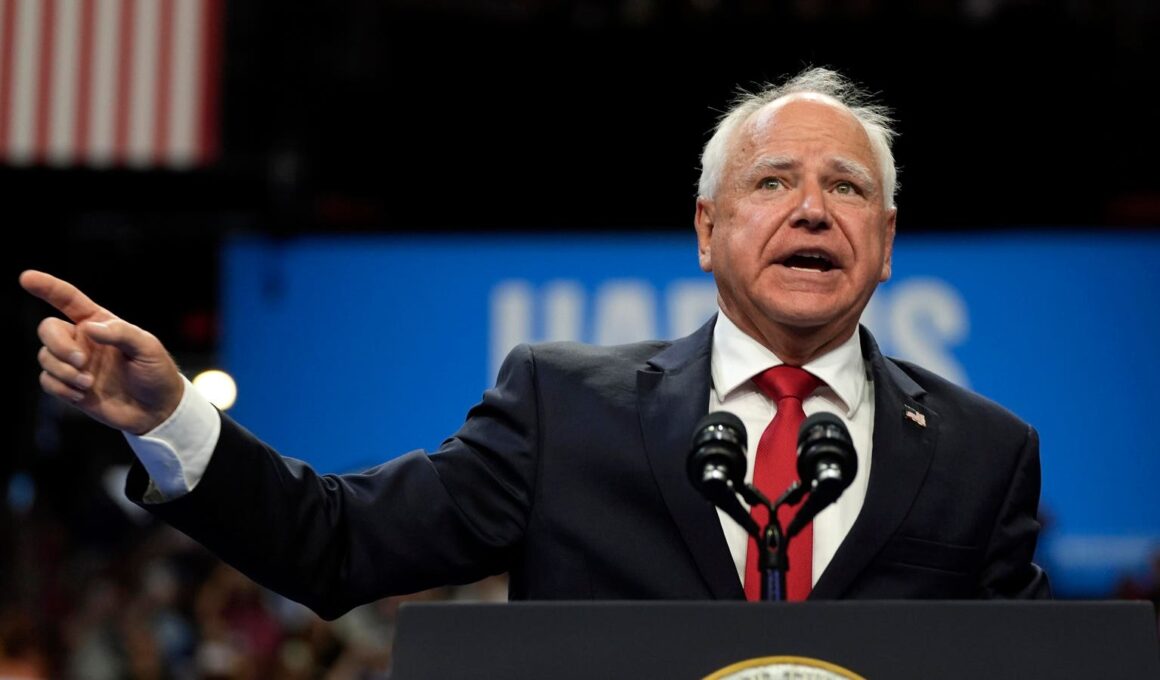Topline
Ohio Sen. JD Vance and Minnesota Gov. Tim Walz have each been thrust into the spotlight as the running mate picks of former President Donald Trump and Vice President Kamala Harris, and a pair of initial polls released Wednesday show Americans hold Walz in slightly higher regard than Vance—though more voters are unfamiliar with Walz.
Minnesota Gov. Tim Walz is seemingly more favorable than Ohio Sen. JD Vance in early polls, but he … [+]
Key Facts
A YouGov poll found 36% of U.S. adults had a favorable view of Vance compared to 47% who found him unfavorable, making his net favorability -11 points.
In the same YouGov poll, 40% of U.S. said Walz was favorable while just 39% said he was unfavorable, giving him a net favorability rating of +1 (the poll, taken Aug. 11-13, surveyed 1,567 adults and had a margin of error of ± 3.3%).
Meanwhile, a Monmouth University poll of registered voters found Vance and Walz had fairly similar favorability numbers (36% and 37% respectively), but voters were more likely to have a negative opinion of Vance, 41%, than Walz, 30% (Monmouth polled 801 people from Aug. 8-12, margin of error ±4).
However, more voters were undecided on Walz than Vance, meaning Walz’s approval ratings could shift: In the YouGov poll, 17% of respondents said “don’t know” when asked about Vance’s favorability, compared to 22% who said the same for Walz.
Nearly a quarter of respondents in the Monmouth poll (24%) said they had not heard of Walz, while just 14% of respondents hadn’t heard of Vance, and 9% of respondents said they had no opinion of either vice presidential option.
Get Forbes Breaking News Text Alerts: We’re launching text message alerts so you’ll always know the biggest stories shaping the day’s headlines. Text “Alerts” to (201) 335-0739 or sign up here.
What To Watch For
How the numbers shift as Walz becomes more of a household name. Recent polling reflects that Walz is still significantly lesser known than Vance: By the time Walz was announced as Harris’ running mate, Vance had been campaigning as Trump’s pick for more than two weeks, which could mean his favorability and unfavorability numbers will be higher as voters have had more time to form an opinion on him. Before getting the nod from Trump, Vance was a fairly well-known senator, whereas Walz was somewhat lower-profile.
Key Background
In the past, experts have been skeptical of whether vice presidential picks have much influence on an election’s outcome, but with November’s race expected to be highly contested, even small boosts from vice presidential picks could be game changers. In the latest FiveThirtyEight averages, Harris had virtually erased the growing lead Trump had on President Joe Biden and is now ahead by nearly three points. Both campaigns have cast their vice presidential picks as politicians who can speak to voters in key midwestern swing states, though Vance is also seen as a Trump loyalist and an appeal to his MAGA base, and some parts of the Democratic base pushed for Walz due to his support for some progressive priorities. Joel Goldstein, professor emeritus at Saint Louis University and an expert on vice presidencies, recently told Minnesota Public Radio that while most people are going to vote on their perception of the presidential candidates, the vice presidential picks provide insight into how they make decisions, which can help voters decide who to support. Running mates can also make differences in their home states, Goldstein said—though in this case, both Minnesota and Ohio are unlikely to be key swing states.
Forbes Valuation
We estimate Vance is worth about $10 million, while Walz has an estimated net worth of just north of $1 million. Vance has made his money on his best-selling memoir, “Hillbilly Elegy,” along with real estate investments that we estimate total about $4 million. Walz, on the other hand, owns no property, stocks or bonds and his wealth is based on his and his wife’s pensions for their work in teaching and government.
Further Reading
Israel and Hamas. Previously, she has covered a range of topics from Donald Trump’s legal battles to Taylor Swift’s path to becoming a billionaire. She joined Forbes in April 2022 and is based in Colorado. Prior to joining Forbes, Bohannon covered local news and spent time at the Fort Collins Coloradoan and the Arizona Republic. She graduated with a degree in journalism from Creighton University and has an MA in investigative journalism from Arizona State. Follow Bohannon for continued coverage of pop culture, politics and updates on the war in Gaza.
“>








